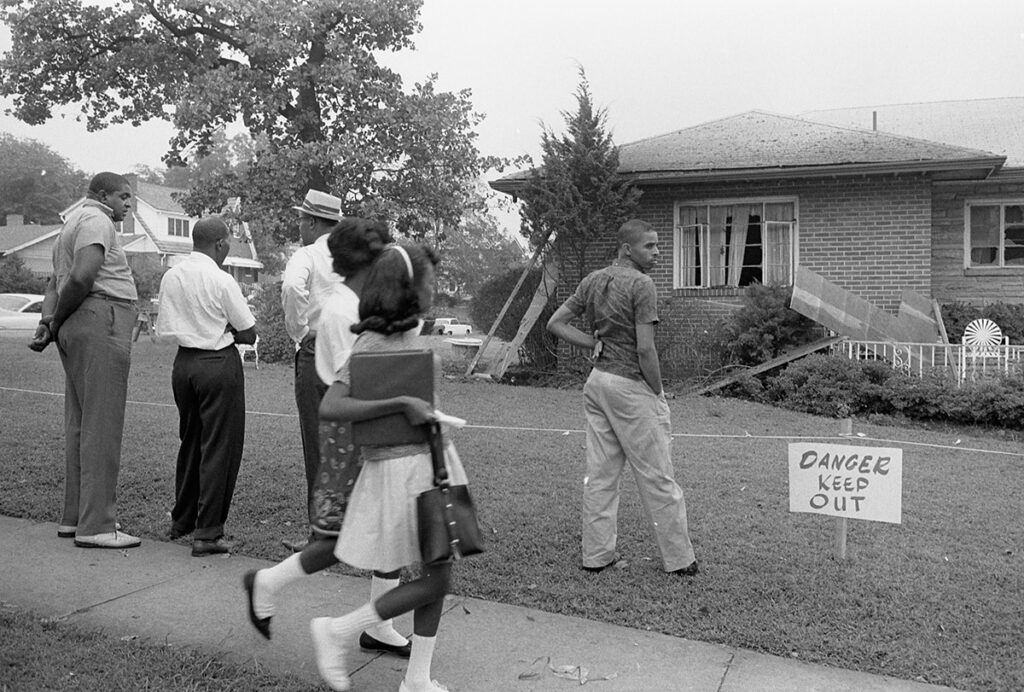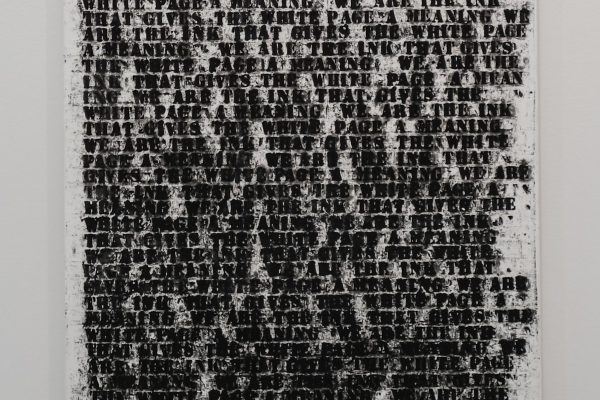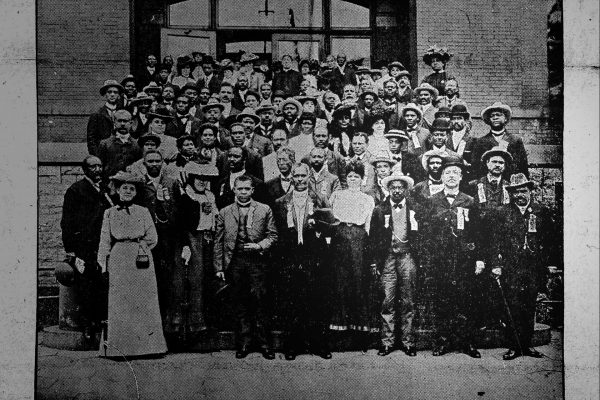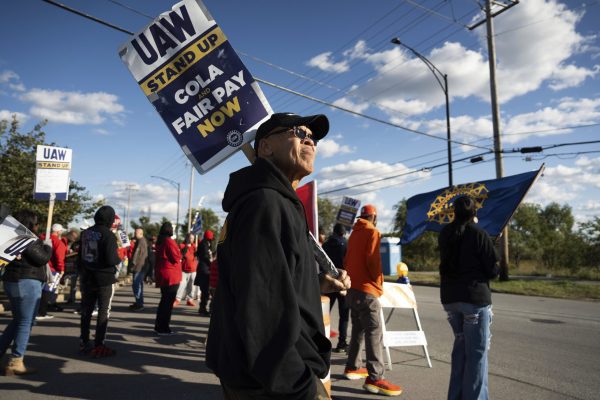Rosie Lee believed in customer service. She understood you gotta give to get. My grandmother gave credit on the dollar, got mean when need be, and wasn’t shy about using the double-barreled .22 in the chifforobe. Then there were the rooms. Rooms men and women entered, some trying not to be seen, sneaking through the front and back doors; others not giving a damn, preferring to let everyone know they were getting laid by somebody else’s main squeeze. I began pouring fifty-cent and dollar shots from the kitchen pantry by the age of eight. By ten I was changing bedsheets and emptying piss pots after Rosie Lee knocked on the door and yelled, “Time!”
I grew up in my grandmother’s house in Birmingham, Alabama, mainly because my parents were schoolteachers and she, being without a nine-to-five, was the only person my mother trusted to watch her child. Over the years, from the time I was able to reason and observe, I noticed the assortment of characters who paraded through the house every day, some comical and some tragic, like Bookie, who moved into my grandmother’s house to take her former boyfriend Bluejay’s place after his stroke left him sideways, dead as a doorknob, on her bed. It took two days to figure out that no one in the family liked Bookie—we thought he was successfully living off my grandmother’s dime. Bookie rose every morning at five o’clock, filled the entire house with the rancid odor of Blue Magic shaving cream, and scraped his bald head with a butter knife. Then he put on Liberty denim overalls like he was going to work, except that was the problem: he didn’t have a job.
By noon his lip dragged the floor like the tongue of a construction boot—worn, faded, and mummified from all the gin it had soaked up. By six Bookie was ignant and a natural fool.
Then there was Catbird, the person who gave me the name Skeeter, who religiously wore dark seersucker suits, white shirts, and felt hats. This small, lanky man possessed the uncanny ability to make the most serious situation humorous, like the times he got paid on a Friday and by Saturday morning his pants pockets drooped like rabbit ears while he swung in the doorway of my grandmother’s bedroom, asking if he could get a fifty-cent shot on credit, his body resembling a damaged toothpick. Bent into a half-moon, he would rock back and forth, crooning, “Teach me how to swim, Rosie Lee; I can drown with the best of ’em.”
Dot was totally different from Bookie and Catbird in that, first, she was a woman, and second, she actually tried to be an ally to my grandmother instead of drinking up all the liquor.
A portly woman who wore knit pants so tight they looked like brushstrokes on her uneven body, Dot instilled the fear of God in some men and most women. On days when Bookie was too drunk and Grandma too tired and I was not around, Dot took the pantry keys to where the liquor stayed locked and dispensed it as requested. Dot put the paper money under her large breast. Every time she dug to give somebody change, I wondered what it felt like to be a quarter under so much weight in her bra. Dot could also play the hell out of some spades.
Spades games were especially exciting after the jukebox man made his monthly rounds to bring new 45s and exhaust the music machine of its nickels, dimes, and quarters.
This essay is featured in Repair.
Men and women would allow this interloper, the color of bleached bones, into their personal space, which did not ordinarily include whiteness. The jukebox man was essential to their existence but as out of place as apples on a lemon tree. See, through music he determined the rhythm of their blues, the octave of voices in card games, or who became Jody on any given night. It would be years later when I learned “Jody” to be another name for a man sleeping with somebody else’s woman. The jukebox man perpetually carried platters of Black gold, where artists like Aretha Franklin, James Brown, Bobby Blue Bland, B. B. King, and Little Johnny Taylor hid in the sleeveless jackets of his Pandora’s box.
While the latest 45s spun, patrons enjoyed the music with head nods and dangling cigarettes, playing spades while their lips sucked on liquor from small white cups and cans or bottles of beer. One card game I remember went something like this: Isaac, a chocolate-skinned, bald-headed man with a raspy voice, slapped his leadoff card on the wafer-thin card table. It spun north by east, revealing a ten of hearts.
“You gotta brang ass to get ass,” Sledge offered with a pull, flick, and release of a jack of hearts. Her occupation was digging fingers into women’s scalps with Crown Royal Grease at Deluxe Beauty Shop one block down the street on Eighth Avenue.
Understanding the mandate given, Bookie drew from his third-grade education, throwing out a six of spades with no eye contact. He banged his fist on the table and yelled: “That’s right! I dranks Johnny Walker Red. Sledge, get your money ready, darlin’, and by the way, your old, wrinkled ass safe with me.” Before ripples of laughter surrounded the room, Dot’s forehead became glued to the ace of spades. Her neck rotated ninety degrees for the men to view while she hissed, “How ’bout kissing my natural Black ass, muthafucka. Get on up from here, nigga! Next!”
Although Brown v. Board of Education was decided in 1954, some schools and districts waited until the early 1970s to desegregate. In Birmingham, the Magic City, that glowing republic of southern oligarchy, compliance came in the waning hours of the fall of 1972.
My mother and I entered Gardendale Elementary as part of the social experiment in integration mandated by the Supreme Court, and I would soon come to find out what it meant to be Black. Before my entry into Gardendale, every time I pledged allegiance in a classroom, it had been with kids who looked like me, kids with whom I learned to high-five, dap up, and shoot marbles between shotgun houses as we meandered into our teenage years.
Toni Morrison took the position that something was lost in segregation. The “lost” doesn’t celebrate the division racism produces but what came out of that division: a way of going against the grain for the sake of the self’s survival. Taking the Blackness forced upon you—the nigga that you became—and making it valuable, something to be studied, imitated, appropriated, and commodified within contemporary culture for the sake of modern art.
Me and the kids I once pledged allegiance with were being conditioned to blindly pledge loyalty to a system we hadn’t begun to understand, nor had that system pledged allegiance to us.
There had been dynamite blasts, water hoses turned on the throngs, billy-club beatings, dog bites, hangings, insurrections, and violence right in our own city; and yet, we remained oblivious to the outer world of segregation, encapsulated in our own subsociety of a perceived otherness. Maybe if we kids had been aware, or if our parents had been more woke, we all would have revolted against this narrative, or at least questioned this insane allegiance to a society not yet fully committed to our best interest.
And yes, I would watch the old Westerns with my father, cheering for the cowboys to do the Indians dirty. Even outside playing with my friends between the shotgun houses in Smithfield, I strutted in full cowboy suit holding a six-shooter cap gun, thinking I could be the Lone Ranger, when actually all I could ever hope to be was Tonto, a sidekick.
What James Baldwin knew—and I didn’t, but would soon find out—was that there always comes a terrifying moment in one’s life, a moment that contextualizes race and from which there is no return. You become the thing to be hunted and treated like an animal. The trauma is difficult to remember and retell.
Then it happened. The ball was up in the air, and Michael Hallmark, my new best white friend, had thrown the spiral perfectly. I was so fast I thought I would jump out of my P.F. Flyers, and they were laced real tight. I wanted to jump high but couldn’t jump high enough because the ball was sailing too far for my fingertips to reach it. The ball hit a girl on her side. I went to pick the ball up. She kicked real hard. Called me “nigger.” And I punched her in the mouth with my fist. Hard. Red appeared on her face. Red blood rolling down her white face. She started crying. I started laughing. I wanted to cry. She called me “nigger” and I hit her real hard and it felt damn good.
Let me be clear. Eunice Pearl Davis, now a Horton but daughter of Rosie Lee, was never a timeout or stand-in-the-corner type of mother.
My mother never hesitated to give teachers full authorization to paddle without parental consent when deemed necessary. I have no memory of how I arrived at the principal’s office to wait for punishment—maybe it was the eerie silence surrounding the “event” because the teachers knew something I did not in terms of the history related to Black boys and white women in the South. The memory of what transpired after my arrival is clear: Eunice Pearl comes into the office and says to the principal standing over me, “Do not lay one hand on him.” When I say never, I mean never ever did Eunice Pearl utter those words in regard to punishment. I knew then, in this racialized moment, my response to an action was bigger than the act. But Baldwin knew there would come a time, and that time had arrived.
It would take a few orbits around the sun for me to understand the enormous weight, the intensity of the primal scene that could’ve taken my life.
My father, who left work with the ghost of Emmett Till on his mind when he got the call from Gardendale Elementary that I had hit a white girl, would years later admit: He had to go.
Had to. He had to because I was in a place that didn’t want me, that said “Hey, nigger” every day to discourage me from falling in love with their idea of beauty, their idea of truth, to never mistake Blackness for whiteness in terms of privilege. The principal wanted integration, was part of a movement in Birmingham for equal education and access, perhaps was a dreamer in believing that all men and women were created equal. In his dream he saw the need to protect this Black boy from a fate all too clear for Black boys who didn’t stay in line. The principal called a meeting with my father and the girl’s parents. The parents wanted blood or neck and were not at all happy their little girl got clocked in the mouth by a nigger, but neither was the Black boy happy at being called “nigger,” so we sat with the conundrum.
In the end, the principal sided with his gut, the question being: What had I done wrong? My parents taught me not to hate. I did not call the girl trailer trash or any of the derogatory terms I would come to know as an adult. Perhaps the principal had no choice if this social experiment was going to have the opportunity to work. But what about the below-the-surface narrative (by those who often control the narrative) whispering in the parents’ ears: You know, he can go missing, done happened before. Turn up in the Coosa River with his face eaten by catfish.
I will never know how close I came to being seen at sunup with my neck snapped in Kelly Ingram Park, hanging from a makeshift wooden cross.
I would go back to school the next day like nothing had happened, that big-ass elephant no one wanted to acknowledge in the room, still present and accounted for. The kids knew what happened. I knew what happened, yet not one of the adults wanted to talk about it openly. No one cared to ask me about the trauma of that moment, the fact that I hit a girl when all my life I had been told that was the one thing never to do.
After that incident, I didn’t associate with the other kids in my class. I only wanted to get as far from that racial madness as humanly possible, because it became evident these people were incapable of being human. I never saw the girl again. Maybe her parents took her out of school, unhappy at how white folks cared about the fate of Black boys in Jefferson County. One thing I am almost certain of, and would love to confirm: the little white girl never called anyone a nigger again.
The next year, sixth grade, I would stroll into an all-Black Catholic school planted directly in the hood, across the tracks in Titusville. Thank God.
There would be bonding over stacked heels and platforms, circular Afros and braided cornrows. We would drown each other in code-switching language, the way we said mane and gull, and we didn’t run from our own skin; as a matter of fact, we ran into it headfirst. We were in a cocoon of Blackness, and whiteness had inverted to the other—they were the others now, and we called each other nigga, but it was love, learning early in life to take what is given and turn it into something valued. I’d left hell and returned to a mythological paradise, if only for a moment. And yet, society would not care about the scars, the racial wounds bandaged up—but would expect me to forgive those who knew damn well what they were doing.
Birmingham isn’t a popular U.S. city for major novels or film productions. Usually, when a person hears Birmingham, they instantly think segregation, Bull Connor, water hoses, German shepherds biting little kids, the scourge of racism. That Black folk in this southern city have always been subjugated and relegated to an otherness from which there is no reconciliation.
Whenever I fly now from New York to Birmingham, I make it a point to rent a car and take the long way to my parents’ house, first veering toward I-65 South from I-20 West, then getting off at Sixth Avenue, crossing the railroad tracks into Smithfield. I like to take in the old viridian shotgun houses still standing in neat rows.
These were scanty wooden structures that offered a straight shot from the front door to the back: open the door into the living room and the next room would be the bedroom, then the kitchen, then the bathroom, then out the back door into a yard with a clothesline pole. Most Black folk who worked in the steel plants rented these lodgings from slumlords such as Otey Real Estate. Segregation made Smithfield an all-Black community with a few Jewish grocery stores that catered to Black folk. My grandmother’s house, which stood at 127 Eighth Avenue North, has long been torn down, and there is nothing left but the foundation of a building that was once one of the most famous juke joints in town.
The one thing Birmingham taught me—and perhaps herein lies my fascination with a city so complicated—is that I never questioned what it meant to be a Black American in the South.
Birmingham conditioned me in a way that has never left me feeling insecure about my pigmentation, why it does and doesn’t matter. I’ve never been confused about this aspect of my reality. When I left Birmingham, I began to see other shades of Blackness and came to understand that there were many who grew up having to ask the question: Am I Black enough?
Growing up, no one in my immediate family ever taught me to look at the world through a white gaze as if it would be the secret formula to a prosperous and meaningful life. Blackness was always the center. My kindergarten was all Black, the first elementary school I attended was all Black, and so was the high school I graduated from in 1979. I went to all-Black summer camps, played on all-Black sports teams, never once questioning the idea of Black or Blackness.
People who did not grow up in Birmingham often disparagingly say they can’t imagine how Black people can grow up there, let alone thrive, which I find interesting, given that every city I’ve lived in has been filled with racism, whether out in the open or hidden in an invisible dialogue that exposes itself most notably through economics and housing.
Whenever I tell people I was born and raised in Birmingham, I get a condescending look, as if to say, I’m sorry. I used to fall for this sentimentality, but nowadays, it is I who feel sorry for the sympathizers because they have been lulled into a trap. I live in New York City, one of the most literary and culturally diverse places in the country. And yet, I can walk out of my tenement on 136th Street and bear witness to racism and discrimination all day long. Just because you don’t hear the word “nigger” doesn’t mean a nigger doesn’t exist within the eyes of people walking up and down your block.
I will admit that being culturally deprived harmed me, and it took years before I understood other people’s idea of Blackness, or what it meant to come from the African Diaspora. At one time I thought Birmingham Black was the only kind of Black; now I know better than to make this narrow assumption, yet I am shaped to this day by a sense of belonging to a particular region, in a particular time, to a particular set of circumstances. It is often said the idea of Blackness is an avant-garde phenomenon, a never-ending reconfiguration, a color adjusting to the contours of society while leaning toward another destination—an arrival and departure—always shape-shifting for the sake of self, for the sake of survival.
I am in the epilogue years and the path forward is not dictated by anyone but me. In the end, perhaps there is no escaping the history one was destined to create. We are historical beings.
Race matters, and there is no outrunning a lived reality. Every Black man is a protagonist in somebody else’s melodrama. There is always a scene, a setting, a backstory. Today my life is compounded by the effects of racism and of having been incarcerated, yet I manage not to be a statistic, not to be stuck in an ever-present stasis, unable to free myself from the invisible clutches of a system that would chew me up and spit me out raw.
Maybe my diatribe is a lament. Maybe color will eat my Black ass alive. Maybe there are experiences I will live and die with and never understand. Maybe I will forever linger between arriving and departing, stuck in media res—always a-holding. Holding to hold on.
Adapted from Dead Weight. Copyright © 2022 Northwestern University. Published 2022 by Northwestern University Press. All rights reserved.








